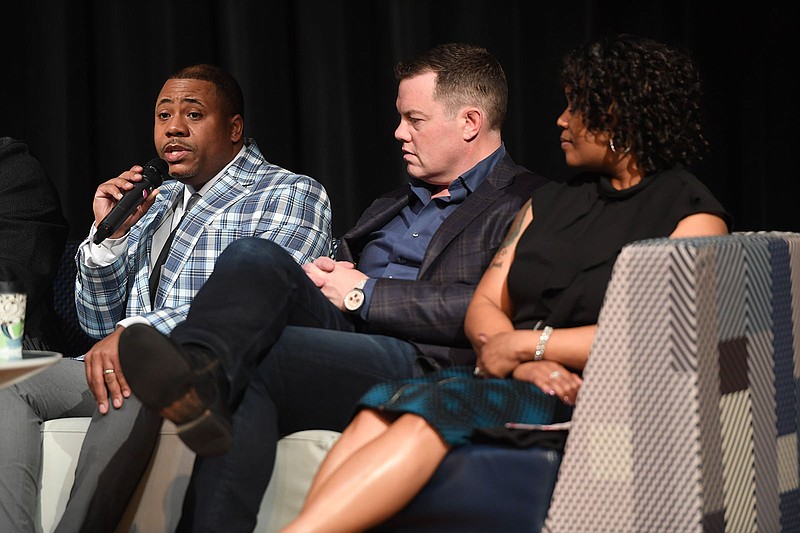FAYETTEVILLE -- No-knock warrants too often have tragic outcomes, and if they had been banned in Minneapolis, "that could've saved [my son's] life," said Andre "Buddy" Locke Sr.
In February 2022, his son, Amir Locke, 22, was shot and killed by police officers during a no-knock warrant in Minneapolis. He was sleeping on a couch when a SWAT team entered the living room of his cousin's apartment. He woke up and grabbed a nearby handgun -- which he was licensed to carry -- and was shot three times. Police were searching for a homicide suspect who was not home at the time, and Locke was not a part of the investigation.
"He was sleeping," he was then "startled," and he "couldn't even get the covers off his head," Locke's father said Thursday. "That definitely hurt [and] this is what we live with daily."
No criminal charges were ever filed against the officers involved in the shooting, but the city of Minneapolis implemented a new ban on no-knock warrants. Currently, Florida, Oregon, Connecticut, Tennessee and Virginia have completely outlawed no-knock warrants.
Locke's father and mother, Karen Wells, now advocate to end no-knock warrants nationwide, as well as for police and criminal justice reform. The elder Locke, Wells, and attorney Jeff Storms, who -- along with Antonio Romanucci and Ben Crump -- is representing the family in a lawsuit, visited the University of Arkansas, Fayetteville on Thursday to share their story at an event hosted by the Solidarity Society in conjunction with the Multicultural Center, Undergraduate Mock Trial and Young Democrats.
"We're standing and speaking up for Amir," Wells said. "Why wasn't he given a chance to say who he was? It's not right."
In February, Locke's family filed a civil lawsuit against the city of Minneapolis, claiming Locke's 4th and 14th Amendment constitutional rights were violated -- as well as state laws -- and seeking compensatory and punitive damages.
No-knock warrants -- in which a judge issues a warrant that allows law enforcement to enter a property without immediate prior notification of the resident -- have become increasingly prevalent, but also contentious. For example, Louisville Metro Police obtained a no-knock warrant for the apartment of Breonna Taylor, who was later killed by police in her apartment in March 2020 by police during an exchange of gunfire with her boyfriend, Kenneth Walker, who claimed he never heard the police announce their presence prior to entry.
"For too long, this was in a vacuum, [and] people didn't see it, hear about it, or pay attention," said Storms, who focuses primarily on civil rights cases. It's "heartbreaking to see the same mistakes in our community over and over again."
Even though the names of those killed at the hands of police can seem to stack up, it's paramount to remember the humanity of each individual victim, panelists said, because every death rips a gaping hole through families.
When Nigel Caffey learned his nephew, Terence Caffey, 30, of Little Rock, died shortly after being arrested at a Little Rock movie theater in December 2021 by Pulaski County sheriff's deputies and Little Rock police officers, "I almost died," he said. "That takes everything out of you, [and] our lives will forever be changed."
Caffey, who was also part of Thursday's panel, said he's appalled by the behavior of officers and first responders toward his nephew. Terence Caffey was arrested after he began fighting with theater employees.
They "disregarded a human's life," Caffey said of the treatment of his nephew. "[I want] to let his story be known."
A death like Caffey's or Locke's "really damages a family -- I'm not the same person I was before -- and I'm not [the only one] damaged by it," Wells said. So, too, are his siblings and other relatives.
"Our 22-year-old baby was taken away by someone who was supposed to protect and serve," she said. "I'm a broken mother."
In fact, she tells herself Amir is "on vacation," she said. "It makes me feel like I'll see him again," even though that won't happen until "I cross over."
When the elder Locke learned of his son's death, he "couldn't believe it," he said. "We always 'see' our son, [and] it's not easy" to live with this tragedy, but "accountability and transparency are so important" to regain the public's trust.
When officers "do wrong, they need to own up to it and say, 'I messed up,'" then face any consequences, Wells said. They also need to practice sincere community policing, interacting positively with the public in the communities they police.
"Get out of your car [to] have friendly conversations [and] open dialogue," she said. Her 6-year-old granddaughter "doesn't trust the police -- how is an officer going to gain her respect? Respect is earned, not given."
For people of color, particularly Black male youth, interacting with police can be "terrifying," as they must confront "a range of horrible possible outcomes," Storms said. "We need to change that so we can all feel safe in our communities."
